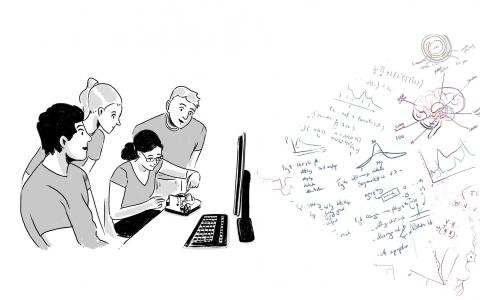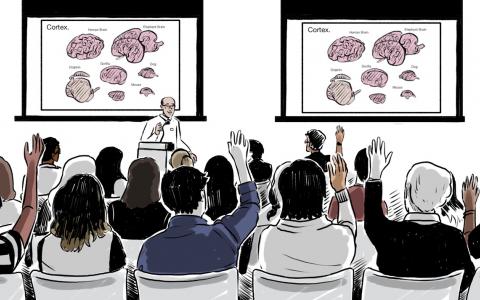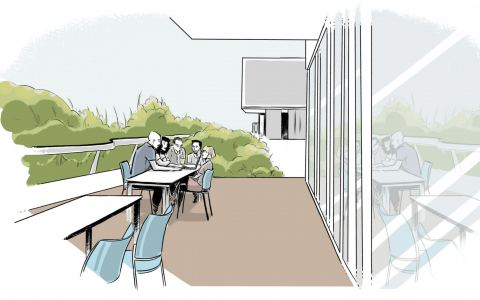
Understanding the brain: 5 key implications for society
By April Cashin-Garbutt
Imagine a world in which we understand the brain completely. Think of all the potential benefits to human health and the problems we could solve through artificial intelligence. While we still have a very long way to go, we asked leading neuroscientists, who have given seminars at SWC, to share their views on the key implications of understanding the brain for society as a whole. Here are their thoughts.
1. Benefit human health
- “The historical motivation for understanding any kind of biological system has been benefits for human health. If we really understood how the brain works at all levels, we presumably would be able to address a number of neurological and neuropsychiatric disorders that are a big burden to society.” Dr Joe Paton, Champalimaud Centre for the Unknown
- “As a psychiatrist, I hope the biggest impact will be that we can treat mental disorders better and improve mental health. That’s both through biology and understanding how the environment interacts with the brain, which can have societal implications: how we design our societies as well as talk about justice and equality. My hope is for mental health to be viewed in a holistic perspective.” Dr Katharina Schmack, Group Leader at Francis Crick Institute and University College London
- “I think both psychiatric and movement-related disorders are absolutely devastating and almost everybody is touched by those diseases, whether they’re suffering themselves or whether a friend or family member is suffering from them.
Psychiatric disorders – like schizophrenia, autism, depression, bipolar, OCD, ADHD – are extremely prevalent and they’re not well understood. There are some treatments – and treatments are getting a lot better – but they’re not where they need to be. The existing treatments don’t work for everybody and they have side effects that people can’t always tolerate, so we need to have a much deeper understanding.
Movement disorders also are equally devastating, whether it’s something like Parkinson’s, Huntington’s, ALS or traumatic brain injury – a spinal cord injury that leads to paralysis. The inability to move is a life-altering and deeply devastating occurrence and we have to be able to treat those disorders better. They’re tragic for the people who are experiencing them and for their caregivers also.
I think we need to make major inroads on both the psychiatric and movement-related disorders and developmental ones as well.” Dr Anne Churchland, Professor in Neurobiology at UCLA
- “The biggest impact of understanding the brain will be firstly in helping to reverse or even prevent age-related cognitive decline and neurodegenerative disorders that impact quality of life.” Dr Zahid Padamsey, University of Edinburgh
- “One of the biggest impacts will be to use insights into the basic mechanisms of the brain for translational purposes so that we can understand what goes wrong in circuits in disease. There are lots of neuropsychiatric disorders and we know the genes involved for some, however what is lacking is an understanding of what goes wrong at the circuit level. To be able to fix these issues, we first need to understand how the circuit normally operates. We can then compare it to the aberrations found in disease and hopefully repair individual components to provide a treatment.” Dr Sarah Ruediger, Postdoctoral Researcher, University of California, San Francisco
- “There will be key medical implications of being able to understand what’s going wrong in neural disorders. There was a period in medicine around a hundred years ago where if you were sick, you would be said to have a fever. While we could describe the symptoms, we didn’t really understand the underlying mechanisms then, such as whether a bacterial infection or virus or something else was causing your fever. I feel that is similar to where we are in neuroscience at the moment. When we talk about something like Alzheimer’s or Autism, we are using an umbrella term that describes a diversity of symptoms. I think there is a lot of work to be done to understand these conditions at the level of individuals.” Dr Ann Kennedy, Assistant Professor, Northwestern University
- “The impact from a health standpoint is helping to end the suffering of humans and other animals. That’s hugely important to me personally. I’d say the most impactful thing would be understanding neurodegeneration. If we can understand degeneration in Parkinson’s and Alzheimer’s, the personal and economic toll on society to eradicate that would be amazing.” Dr Michele A Basso, Professor in the Departments of Psychiatry and Biobehavioral Sciences and Neurobiology, UCLA
2. Comprehend ourselves much deeper
-
“Understanding the brain would help us comprehend ourselves much deeper. We often take our brain for granted and don’t realise how much it is doing for us until some aspect goes wrong.
I recently visited the Lushan mountain in China. Around 1,000 years ago, a famous poet called Su Shi wrote “we don’t see the full picture of Lu mountain because we are inside of it” and I think that’s exactly the same situation in neuroscience. Both scientists and society need to be aware of how the brain allows us to live so peacefully as human beings. Understanding more mechanisms and exposing them to society will help us tackle health problems such as preventing and treating mental disorders.” Dr Yu Mu, Principal Investigator, Institute of Neuroscience, Chinese Academy of Sciences
-
“I think the biggest impact would be curing diseases. I will also go beyond that and say, if you ask people what they would change about themselves, the number one most common thing on surveys would be: more self-control.
There are a bunch of people, including myself, who would love to have more self-control but don’t have any diagnosed psychiatric illness. In extreme cases, diminished self-control is associated with drug addiction, anxiety, and depression. If we could say anything useful about what self-control is, how we can improve it and what goes on in the brain when self-control succeeds versus fails – that would be big.” Dr Ben Hayden, Professor of Neuroscience at University of Minnesota
- “Outside of disease, I think understanding who we are and how we make decisions will have a big impact. I find neuroscience fascinating from an evolutionary perspective and I think understanding the way that evolution shapes the brain and sets the kinds of behaviour that animals express, will help us make sense of how genes shape neural circuitry and how that pre-wiring is combined with experience in different parts of the brain in organisms.” Dr Ann Kennedy, Assistant Professor, Northwestern University
- “From an intellectual standpoint, I think the biggest impact will come from understanding how the brain gives rise to our incredibly rich personal experiences. The brain allows us to have inner lives where we can plan and remember fondly meals that we’ve had or interactions with people. It’s joyous to be alive and to be human. How does the brain do that? All the brain has is action potentials – these little changes in voltage that happen at different points in time – and they give rise to this unbelievably rich experience. To me understanding the brain is way more interesting than what’s happening on Mars! Although of course, as a scientist Mars interests me too!” Dr Michele A Basso, Professor in the Departments of Psychiatry and Biobehavioral Sciences and Neurobiology, UCLA
3. Inspire future neuroscientists
-
“The third impact of studying neuroscience is that the brain is the most fascinating organ in the body and if we get some concrete understanding of how certain functions are being performed, this will inspire more people to devote their life to research. I think this is meaningful for humankind as young people see hope and the potential interesting directions that research will take.” Dr Yu Mu, Principal Investigator, Institute of Neuroscience, Chinese Academy of Sciences
4. Build the next generation of artificial intelligence
- “Understanding the brain may help to inspire the development of AI and brain-machine interfaces. You can imagine, when used in the right way, these technologies could greatly aid our ability to understand and change the world.” Dr Zahid Padamsey, University of Edinburgh
- “I think we are now in an age where there are large implications of understanding natural intelligence for building the next generation of artificial intelligence. If you consider the impact of neuroscience on artificial intelligence, then there’s the possibility of impacting almost every sector of society.
In addition to potential benefits, there are also a lot of potential risks and ethical questions we are going to need to grapple with. I hope that society can make good use of what we’ve learned.” Dr Joe Paton, Champalimaud Centre for the Unknown
- “There are good and bad implications for society. There is a lot of risk in artificial intelligence. As we understand how natural intelligence works, this will allow us to have better artificial intelligence and you can imagine all the ways in which having technology in the hands of some can be dangerous.
There will be a lot of possibilities for misleading people, because when we know how people think, we can potentially deceive them. Hopefully the tools can also be used to rectify that deception, but it is very tricky because how do we get an algorithm to fight another algorithm on truth? How do we know who is telling the truth? These are really complicated things and as our understanding of intelligence grows, the risk of that grows too.
Another huge impact will be in medicine and one major impact is going to be with brain-computer interfaces. The ability to talk to a brain and listen to a brain directly could give people who are injured the opportunity to use robots to move, or artificially see or hear again. We already have some rudimentary prosthetics. For example, there is an engineering firm that is trying to stimulate the retina. The engineers at the company were zapping the retina with current to try to get the neurons to respond but it wasn’t working even when they used more and more power. My colleague spoke to them and explained how neurons are sensitive to biphasic currents and when the engineers tried this it worked and they were able to stimulate the brain. This shows how understanding the brain can enable us to talk to the brain.
Once you have prosthetics, then the sky is the limit. You could begin by controlling a robot arm by thinking about moving your own arm, but then you could even learn to control a limb that you don’t initially have a representation for in your brain. Another interesting concept is prosthetic cognitive modules, such as memory chips. These could be artificial silicon circuits outside the brain that could talk to the brain in a similar way so that we could use that information.” Dr Xaq Pitkow, Principal Investigator, Baylor College of Medicine and Rice University
5. Understand consciousness in humans, animals and maybe even machines
-
“Because of my strong interest in consciousness, to me the thing that guides my research is trying to understand why I experience the way I experience. When you go to sleep, and you don’t dream, you don’t exist. Your biology is still there – your neurons continue firing – but you are not there until suddenly you wake. To me, this is what I would like to understand. Then comes, language, memories and so forth, but first and foremost, I want to understand how we experience.
If we understood consciousness this would impact our ethical behaviour. For instance, if we had a ‘conscious meter’ that could tell when an animal suffers, this would influence our decisions on animal research, food intake, etc. Similarly, imagine a patient in a vegetative state – if it was shown they don’t experience anything, then, perhaps medical care would be completely different.
From my point of view, experience is what comes with ethics. And the other way around: once we understand experience, we can extrapolate that to other animals, and perhaps even machines and ask whether they can have consciousness? If a self-driving car runs someone over – was it a bad car?” Dr Lucia Melloni, Group Leader at the Max Planck Institute for Empirical Aesthetics in Frankfurt am Main, Germany


